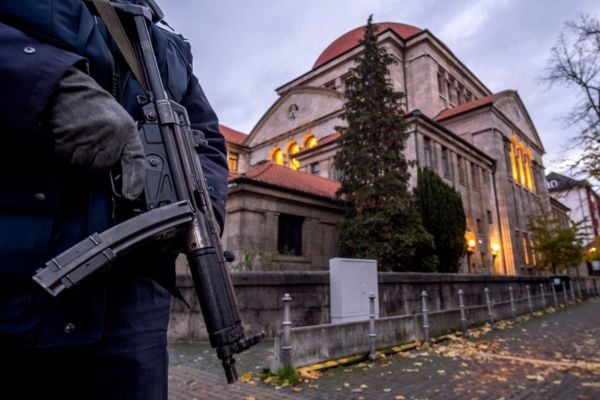Approximately 30 percent of the crimes involved vandalism or damage to property, with another 15 percent categorized as incitement.
By Ben Cohen, Algemeiner
German officials announced on Monday that more than 3,500 crimes emanating from the Oct. 7 Hamas pogrom in southern Israel have been recorded, at least 14 percent of which can be considered unambiguously antisemitic.
At a joint press conference on Monday at the Berlin headquarters of the Joint Counter-Terrorism Center, where federal and state authorities exchange information on threats to national security, Nancy Faeser, Germany’s Interior Minister, and Holger Münch, president of the Federal Criminal Police Office (BKA), disclosed that a total of 3,532 crimes related to the Hamas onslaught six weeks ago have been reported.
Of these, 500 were clearly antisemitic, mainly perpetrated by Islamists, Münch said. Approximately 30 percent of the crimes involved vandalism or damage to property, with another 15 percent categorized as incitement. “The number of violent crimes is in the mid three-digit range. That is also high,” he said.
Münch warned that while there was no intelligence suggesting an imminent threat to Jewish institutions, “the potential for escalation is great.” He noted as well that there had been a 47 percent increase in antisemitic incidents in Germany during the last four years, some of which came from the far right, but much of which can be pinned on “foreign religious ideologies” — a reference to Islamist extremism.
Faeser, who has expressed support for the deportation of Hamas supporters in Germany who are not permanent residents, separately decried the “disgusting terrorist propaganda” promoted by supporters of Hamas, pledging to retain pressure on social media platforms to shut down pro-Hamas accounts. A total of 98 channels on the Telegram channel have been shut down at the urging of the BKA, while the total number of requests to shut down offending accounts across all social media platforms was 500.
Monday’s press conference came on the eve of the first meeting in nearly two years of the German Islamic Conference (DIK), an umbrella body created in 2006 to bring together the leadership of Muslim communities in Germany. The two-day parley will address the theme of “combating antisemitism and anti-Muslim hostility in times of social division.”
The meeting will not include representatives of the Central Council of Muslims (ZRM), whose secretary-general, Abdassamad El Yazidi, issued a much-criticized statement on Oct. 8 which failed to condemn Hamas outright for its onslaught against Israeli civilians. The ZRM also faced strong disapproval for allegedly dithering over the suspension of the Islamic Center of Hamburg (IZH), a Shi’a organization supported by the Iranian regime that has been closely monitored by the federal Office for the Protection of the Constitution. The IZH from the Council was suspended only after a search of its facilities by police officers.
Speaking to broadcaster DW on Monday, El Yazidi insisted that it was “unfair and insulting” to portray the ZRM as supporting Hamas. However, he added, he regretted his statement of Oct. 8, saying that “it would have been better to condemn the barbarism of Hamas, make one point and [make the other point] later.”
In a separate interview on Monday, the newly-appointed Mayor of Munich, Domink Krause, said that the authorities in the Bavarian capital would adopt a similar stance to radical Muslim organizations as with the far right.
“We should not work with those communities that are radical, just like we don’t work with right-wing extremist organizations,” Krause told the Abendzeitung news outlet.
Asked whether he was playing into the hands of right-wing parties by highlighting Muslim antisemitism when he himself is on the left of the Green Party, Krause demurred. “It was always clear to me that I would take a clear stance on a wide variety of discrimination and attacks on democracy,” he said. “And that should apply to everyone — beyond the political camps. I also find it problematic when groups from the left of the political spectrum now begin to organize against Israel.”
Krause added that he had been talking to contacts in Be’er Sheva, the Israeli city twinned with Munich. “At the moment, everything is heavily influenced by concern about the hostages, concern about the military operation, and how the situation will develop further,” he said.
He added that “there is also a lot of compassion for the Palestinian civilian population, but also the very clear statement: As long as Hamas is there, there will be no peace, neither for the Palestinians nor for the Israelis. Action must now be taken against Hamas. What should not be forgotten is that rockets are still flying towards Israel — Be’er Sheva is relatively close to the border with the Gaza Strip, and there was also destruction there.”
Krause’s Green Party colleague, federal Food and Agriculture Minister Cem Özdemir, also criticized Germany’s Muslim leadership on Monday, emphasizing the role played by Ditib, a Turkish Muslim organization that commands the loyalties of 900 imams across Germany.
Ditib is in turn supervised by Diyanet, the Turkish government’s Directorate of Religious Affairs, whose head, Ali Erbas, was denounced by Özdemir as “simply an antisemite.” Erbas recently described Israel as a “rusty dagger in the heart of the Muslim world.”
Diyanet reports directly to Turkish President Recep Tayyip Erdogan, whose barbs against Israel have multiplied since Oct. 7. Erdogan flew to Germany last week for an official visit that brought fresh German media attention on the activities of Turkish lobby groups in the country.
